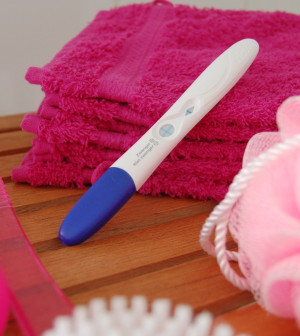- 8 Ways to Increase Dopamine Naturally
- 7 Best Breads for Maintaining Stable Blood Sugar
- Gelatin vs. Collagen: Which is Best for Skin, Nails, and Joints?
- The Long-Term Effects of Daily Turmeric Supplements on Liver Health
- Could Your Grocery Store Meat Be Causing Recurring UTIs?
- Are You Making This Expensive Thermostat Error This Winter?
- Recognizing the Signs of Hypothyroidism
- 10 Strategies to Overcome Insomnia
- Could Artificial Sweeteners Be Aging the Brain Faster?
- Techniques for Soothing Your Nervous System
Kids Still Spanked, to Their Detriment, Study Finds


MONDAY, Oct. 21Spanking can affect a child’s behavior and learning ability for years, with the impact of physical discipline reverberating even as kids near adolescence, a new study suggests.
Nine-year-olds who were spanked at least twice a week by their mother at age 3 or 5 are much more likely to break rules and act aggressively than children who weren’t spanked, according to the study, which was published online Oct. 21 in the journal Pediatrics.
Those children also were more likely to score lower on vocabulary and language-comprehension tests if their fathers spanked them twice weekly or more at age 5.
“We found there were impacts not just on the behavioral development that folks normally look at, but also on markers of cognitive development, like the verbal capacity of the child,” said co-author Michael MacKenzie, an associate professor at the Columbia University School of Social Work in New York City. “These effects are long-lasting. They aren’t just short-term problems that wash out over time. And the effects were stronger for those who were spanked more than twice a week.”
MacKenzie described the findings as “one additional brick” to lay on the growing pile of research that links spanking to aggression and behavior problems.
A study published in March found that spanking kids who have a genetic predisposition to aggressive behavior makes them more aggressive. Canadian researchers in July released a study that found that up to 7 percent of a range of adult mental-health disorders were associated with physical punishment during childhood.
“People keep finding it again and again,” MacKenzie said. “Spanking may be the largest contributing factor to a child’s acting out.”
Thirty-two countries prohibit physical punishment of children by parents or caregivers, but the practice is allowed in the United States and Canada. The American Academy of Pediatrics strongly recommends against the use of physical punishment as a form of child discipline.
The Columbia study focused on nearly 2,000 families in 20 cities in the United States.
When kids were 3 and 5 years old, researchers asked parents how often they had spanked their child in the previous month because the kid was misbehaving. The researchers assessed the children’s aggressive behavior and vocabulary at ages 3 and 9.
Overall, 57 percent of mothers and 40 percent of fathers spanked their children at age 3, while 52 percent of mothers and 33 percent of fathers reported spanking at age 5.
Children whose mothers spanked them at ages 3 and 5 proved more likely to act aggressively and break rules at age 9, the researchers found.
Age 5 appears to be a particularly tender age. Any amount of maternal spanking made a child more likely to act out by age 9, the researchers found. By comparison, only frequent spanking — twice or more a week — at age 3 had an effect on 9-year-olds’ aggression.
“I think this finding — now consistent in the research literature — surprises people who have used spanking because they tend to focus on results they can see right away, that spanking might get their child to stop doing what they are doing in the moment,” said Catherine Taylor, associate professor of global community health and behavioral sciences at Tulane University School of Public Health & Tropical Medicine in New Orleans.
“Even if children don’t act on their bad feelings immediately, nobody is happy to be hit,” said Taylor, who was not involved in the study. “The parent is inadvertently teaching the child that hitting, or being aggressive, is a way to solve problems.”
Spanking by fathers did not appear to have an effect on later behavior. However, it did have an effect on a child’s language skills by age 9, the researchers found.
Children whose fathers spanked them frequently at age 5 were much more likely to score poorly on tests that judged their receptive vocabulary, which is the ability to recognize and understand words upon hearing or reading them.
This second finding “suggests that when parents — in this case fathers — hit children for disciplinary purposes, it has long-term effects on children’s receptive verbal capacity,” Taylor said.
“This, of course, has implications for children’s academic performance and general success in life,” she said.
Researchers have a much better idea of why spanking influences aggression than why it influences learning ability, MacKenzie said.
Families who spank may be less likely to read to their kids or guide their language development. The stress children feel as a result of spanking also might play a part. “We know that kids who are physically abused have cognitive development problems,” he said.
By assessing aggression and vocabulary at age 3, the study also tested the argument that some kids are just poorly behaved and therefore receive more spankings. They found that the delayed behavioral and cognitive effects of frequent spankings at age 5 by mothers and fathers remained firm regardless of how poor the child’s early behavior was.
“It doesn’t wash out the effect,” MacKenzie said. “It’s still there.”
Although the research showed an apparent association between spanking and a child’s behavior and learning abilities, it did not necessarily prove a cause-and-effect relationship.
More information
For more information on child discipline, visit the Nemours Foundation.
Source: HealthDay
Copyright © 2026 HealthDay. All rights reserved.










